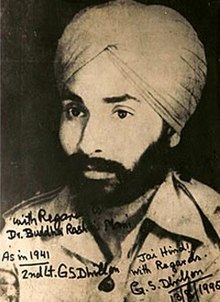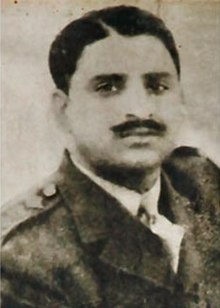
Back ভারতীয় জাতীয় সেনাবাহিনীর বিচার Bengali/Bangla Juicios del Ejército Nacional Indio Spanish Procès de l'armée nationale indienne French आजाद हिन्द फौज पर अभियोग Hindi ஐஎன்ஏ வழக்குகள் Tamil

The Indian National Army trials (also known as the INA trials and the Red Fort trials) was the British Indian trial by court-martial of a number of officers of the Indian National Army (INA) between November 1945 and May 1946, on various charges of treason, torture, murder and abetment to murder, during the Second World War.
Jawaharlal Nehru in Poona had announced that Congress would stand responsible for the trials. The committee formed for the defence of INA soldiers was formed by Congress Working Committee. It included Jawaharlal Nehru, Bhulabhai Desai, Asaf Ali, Tej Bahadur Sapru, Kailash Nath Katju and others.[1]
Initially, over 7,600 members of INA were set for trial but due to difficulty in proving their crimes the number of trials were significantly reduced.[2] Approximately ten court-martials were held. The first of these was the joint court-martial of Colonel Prem Sahgal, Colonel Gurbaksh Singh Dhillon, and Major-General Shah Nawaz Khan. The three had been officers in the British Indian Army and were taken prisoner in Malaya, Singapore and Burma. They had, alongside a large number of other troops and officers of the British Indian Army, joined the Indian National Army and later fought in Burma alongside the Japanese military under the Azad Hind. These three came to be the only defendants in the trials who were charged with "waging war against the King-Emperor" (the Indian Army Act, 1911 did not provide for a separate charge for treason) as well as murder and abetment of murder. Those charged later only faced trial for torture and murder or abetment of murder.
The trials covered arguments based on military law, constitutional law, international law, and politics. Historian Mithi Mukherjee has called the event of the trial "a key moment in the elaboration of an anticolonial critique of international law in India."[3] As it was an army trial, Lt. Col. Horilal Varma Bar At Law & the then-Prime Minister of the Rampur State, along with Tej Bahadur Sapru, served as the lawyers for the defendants. These trials attracted much publicity, and public sympathy for the defendants, particularly as India was in the final stages of the Indian independence movement. Outcry over the grounds of the trial, as well as a general emerging unease and unrest within the troops of the Raj, ultimately forced the then-Army Chief Field Marshal Claude Auchinleck to commute the sentences of the three defendants in the first trial.



- ^ Singh, Harkirat (2003). The INA Trial and the Raj. Atlantic Publishers & Distributors. p. 54. ISBN 978-81-269-0316-0.
- ^ Bayly, Christopher; Harper, Tim (2008). Forgotten Wars: The End of Britain's Asian Empire. Penguin Books Limited. p. 262. ISBN 978-0-14-190980-6.
- ^ Mukherjee, Mithi (2019). "The "Right to Wage War" against Empire: Anticolonialism and the Challenge to International Law in the Indian National Army Trial of 1945". Law and Social Inquiry. 44 (2): 420–443. doi:10.1017/lsi.2019.12. S2CID 191697854.
© MMXXIII Rich X Search. We shall prevail. All rights reserved. Rich X Search